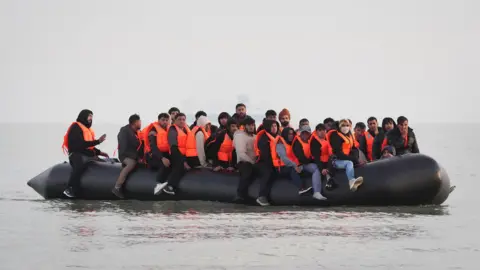In a recent update regarding the alarming number of migrants crossing the English Channel in small boats, Home Secretary Yvette Cooper has announced that the French government is actively reviewing its policing strategies. This discussion came to light after more than 1,100 migrants successfully made the crossing on a single Saturday, marking the highest number recorded for this year. The surge in crossings has drawn considerable attention and criticism, particularly aimed at French authorities, for their perceived lackadaisical approach to managing the situation.
Home Secretary Cooper faced significant scrutiny from various members of parliament, particularly from the Conservative opposition. Shadow Home Secretary Chris Philp pointed out that French police appeared to stand by idly as migrants embarked on their perilous journey from the French coastline. In response to this criticism, Cooper reassured MPs that she is pursuing robust agreements with the French authorities that would empower their police to intercept migrants in the shallow waters before they can embark on their crossings.
A critical legal loophole in French law leaves law enforcement unable to act when migrants are in the water, which effectively allows criminal gangs to exploit the situation. They have become adept at timing their escorting of migrants in a way that allows them to wait in shallow surf until a boat approaches, which is legally difficult for authorities to intervene in. Despite previous assurances from French Interior Minister Bruno Retailleau to address this loophole, substantial policy changes have yet to be implemented, prompting frustration on all sides.
During the parliamentary session, Cooper emphasized the urgency of the review being conducted by the French interior minister. “French authorities have recognized that their protocols need revision,” she stated, highlighting that “a French maritime review is currently evaluating new operational tactics.” She indicated her commitment to pressuring France to complete this evaluation quickly and enact necessary changes to bolster policing efforts along the coast.
Philp further called for a more hardline stance from the government, advocating for French police to take active measures to prevent boats from departing. In a sharp critique, he remarked that authorities are not effectively dismantling the operations of criminal enterprises, saying, “They’re not smashing gangs; they’re smashing records.” This suggests a growing dissatisfaction with the current measures in place to control illegal migration.
Moreover, Philp referenced a recent deal that grants EU fishing vessels continued access to UK waters until 2038, arguing it should be put on hold until France takes significant steps to stem the flow of small boats and address unlawful immigration. Cooper retorted by challenging Philp’s previous tenure as immigration minister, stating that he had failed to gain meaningful action from the French.
Cooper pointed out that the current government has indeed secured a new agreement with the French and is adamantly pursuing its swift operationalization. She firmly stated, “We won’t take lessons from a former immigration minister who allowed legal migration to triple and saw small boat crossings balloon by more than ten times during his watch.”
The situation remains critical, and the emergence of large numbers of migrants risking their lives in the turbulent waters of the English Channel has not only engaged the political arena but has also drawn widespread media coverage. There is a pressing need for collaboration between the UK and French authorities to develop effective strategies that ensure the safety of individuals while curbing the influence of human trafficking networks. The coming weeks will be crucial as discussions continue and potential policy shifts are anticipated, signaling a period of intensified scrutiny over immigration policy and procedural response to the crisis at hand.
The interplay of political pressures, public safety concerns, and human rights considerations complicates the response to this humanitarian issue. As both nations wrestle with the implications of border management and international obligations, any changes in policy will require careful negotiation to balance national interests with pressing social realities.



